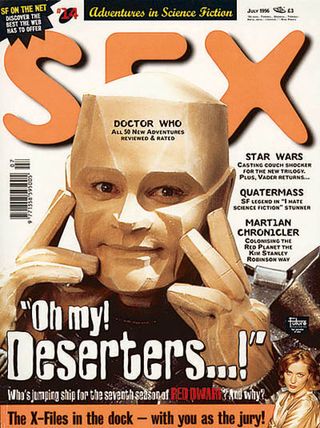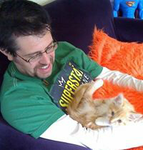SFX Issue 14
None

July 1996
Interview:
Nigel Kneale on (the unknown) Nigel Kneale
Wuthering Heights (1953)
Live BBC version of Emily Bronte classic, starring Richard Todd.
Kneale: “There’s always some horror attached to these things. There’s a scene where Kathy encounters Heathcliffe who is working as a stable boy. Of course there’s no point in having a horse in a live studio, but in the props department there was the hind part of a horse. And the director was going, ‘Keep the camera off the bit where there’s no more horse!’”
Look Back in Anger (1958) & The Entertainer (1960)
Screenplays for two classic film versions of John Osborne’s plays, starring Richard Burton and Laurence Olivier respectively.
Kneale: “I was just asked to do them because I’d worked with Tony Richardson at the BBC. He just rang up and said would I do it? I think what had happened was that John Osborne had written a script for Look Back in Anger and couldn’t get finance for it.”
The Road (1963)
Spooky ghost story set in 1770. Mysterious noises in a haunted wood turn out to be the echo of a future event, the noise generated by a mass panic as people try to escape a nuclear attack.
Kneale: “I kept meeting film directors later who said, ‘Oh, I saw something on the telly that had a total effect on my career,’ and they’d tell me the story of this thing. Rodney Bewes was in it.”
Sign up to the SFX Newsletter
Get sneak previews, exclusive competitions and details of special events each month!
The Crunch (1964)
ITV drama about a small ex-colony hiding a nuclear device in the cellar of their London embassy.
Kneale: “This was a very sharp number. The idea – an atom bomb ransom – was ahead of its time. Harry Andrews was the Prime Minister, and we had Peter Bowles in it as a young officer who behaved outrageously. That was the original nuclear blackmail story.”
The Year Of The Sex Olympics (1968)
A biting satire, starring Leonard Rossiter. In a future where the only people with a life are those who make TV shows, a family seeks refuge on an island.
Kneale: “That was a very nice show. It posited a world audience who are all couch potatoes, and a small family group say, ‘We want to go away and live on a desert island – and suffer if need be.’ They’re sent to somewhere up in the Orkneys and settle down to their lonely life, but the whole place has been bugged. Now they are a television show.”
Wine Of India (1970)
Brian Blessed and Annette Crosbie starred as a couple who were celebrating their own funeral in this futuristic examination of mortality and medicine.
Kneale: “Everybody was given spare parts – heart and lungs and so on. You’re given a life contract and they guarantee to keep you in perfect health for that time. But when the contract day arrives, you must go. So the scene is a funeral, but the people are alive. They were given slightly drugged drinks for the party, and that was the wine of India.”
The Stone Tape (1972)
A research crew in an old house witness mysterious psychic events “recorded” in the building. Directed by Peter Sasdy ( Taste the Blood of Dracula , etc).
Kneale: “That was quite a good one. It was a ghost story. Chris Morahan suggested it and I wrote it. There’s no doubt that there is a ghost. They use all these electronics to track it.”
Ms Whickham In The Fall (1956)
Non-fantasy tale of intolerance in France, in the wake of the German occupation.
Kneale: “That was quite a nice one. It was just about an American retired couple who get stuck in a small French town, and there’s a greatly despised boy who was the child of a German soldier and a French girl. Of course, he’s given a hard time, so the Americans adopt him and take him back to a happy life.”
Ladies’ Night (1986)
Odd, blackly humorous series about a gentleman’s club.
Kneale: “That was just a horrible gentlemen’s club where they don’t want any women. They’re only allowed to come one night a week, but one man who has been bullied by his wife gets so horrendously overcome that when they retire for the night he hits her over the head with an ornament and kills her. This meets with the entire approval of everybody else in the club! The only question is disposing of the body.”

Dave is a TV and film journalist who specializes in the science fiction and fantasy genres. He's written books about film posters and post-apocalypses, alongside writing for SFX Magazine for many years.
Most Popular






